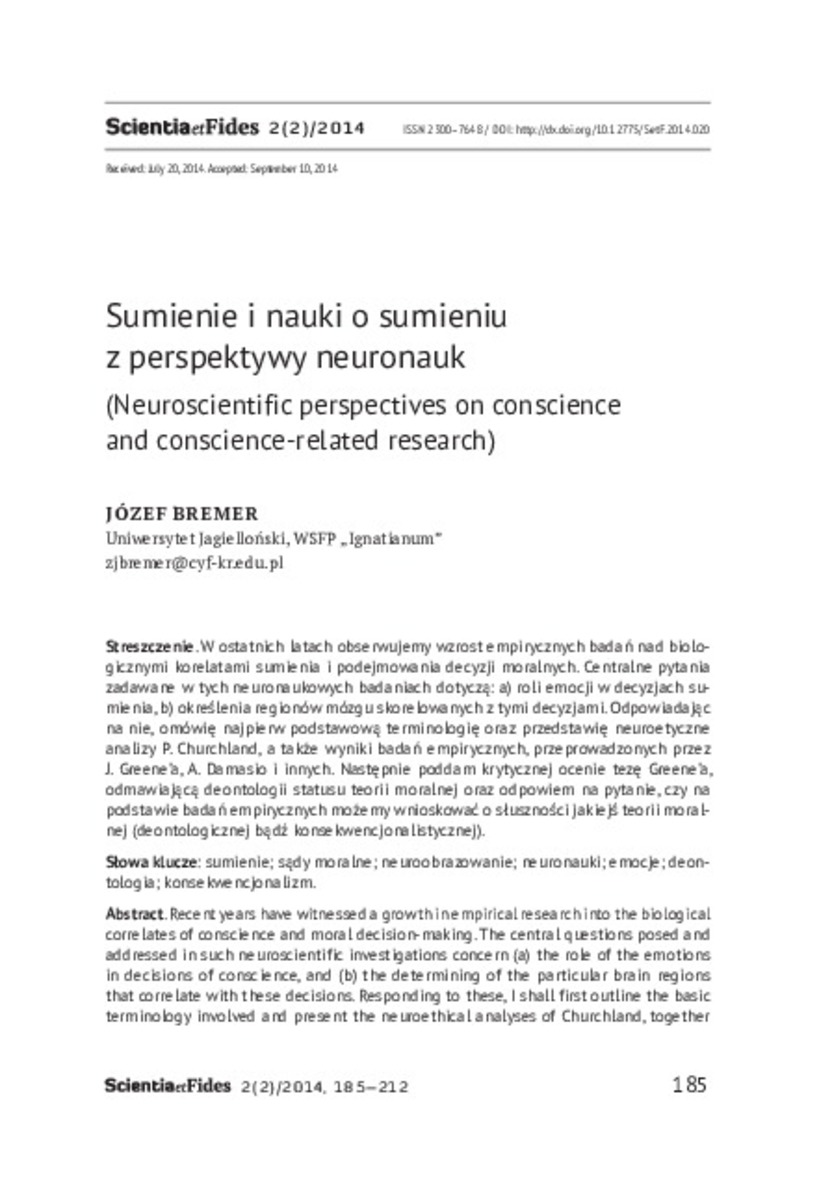Full metadata record
| DC Field | Value | Language |
|---|---|---|
| dc.creator | Bremer, J. (Józef) | - |
| dc.date.accessioned | 2015-01-15T16:24:07Z | - |
| dc.date.available | 2015-01-15T16:24:07Z | - |
| dc.date.issued | 2014 | - |
| dc.identifier.citation | Bremer, Józef. ”Sumienie i nauki o sumieniu z perspektywy neuronauk”, Scientia et Fides, Vol. 2, n. 2, 2014, pp.185-212. | es_ES |
| dc.identifier.issn | 2300-7648 | - |
| dc.identifier.uri | https://hdl.handle.net/10171/37286 | - |
| dc.description.abstract | Recent years have witnessed a growth in empirical research into the biological correlates of conscience and moral decision-making. The central questions posed and addressed in such neuroscientific investigations concern (a) the role of the emotions in decisions of conscience, and (b) the determining of the particular brain regions that correlate with these decisions. Responding to these, I shall first outline the basic terminology involved and present the neuroethical analyses of Churchland, together with the findings of the empirical studies carried out by Greene, Damasio and others. I then offer a critical assessment of Greene’s thesis claiming that deontology should be denied the status of a moral theory, before addressing the issue of whether it is at all possible to arrive at conclusions about the correctness of any sort of moral theory – be it deontological or consequentialist – on the basis of empirical research. | es_ES |
| dc.description.abstract | W ostatnich latach obserwujemy wzrost empirycznych badań nad biolo- gicznymi korelatami sumienia i podejmowania decyzji moralnych. Centralne pytania zadawane w tych neuronaukowych badaniach dotyczą: a) roli emocji w decyzjach sumienia, b) określenia regionów mózgu skorelowanych z tymi decyzjami. Odpowiadając na nie, omówię najpierw podstawową terminologię oraz przedstawię neuroetyczne analizy P. Churchland, a także wyniki badań empirycznych, przeprowadzonych przez J. Greene’a, A. Damasio i innych. Następnie poddam krytycznej ocenie tezę Greene’a, odmawiającą deontologii statusu teorii moralnej oraz odpowiem na pytanie, czy na podstawie badań empirycznych możemy wnioskować o słuszności jakiejś teorii moralnej (deontologicznej bądź konsekwencjonalistycznej). | es_ES |
| dc.language.iso | pol | es_ES |
| dc.publisher | Universidad Nicolás Copérnico de Torun | es_ES |
| dc.rights | info:eu-repo/semantics/openAccess | es_ES |
| dc.subject | Materias Investigacion::Teología y Ciencias religiosas | es_ES |
| dc.subject | Consequentialism | es_ES |
| dc.subject | Deontology | es_ES |
| dc.subject | Emotions | es_ES |
| dc.subject | Neurosciences | es_ES |
| dc.subject | Neuroimaging | es_ES |
| dc.subject | Moral judgements | es_ES |
| dc.subject | Conscience | es_ES |
| dc.subject | Konsekwencjonalizm | es_ES |
| dc.subject | Deontologia | es_ES |
| dc.subject | Emocje | es_ES |
| dc.subject | Neuronauki | es_ES |
| dc.subject | Neuroobrazowanie | es_ES |
| dc.subject | Sądy moralne | es_ES |
| dc.subject | Sumienie | es_ES |
| dc.title | Sumienie i nauki o sumieniu z perspektywy neuronauk | es_ES |
| dc.title.alternative | Neuroscientific perspectives on conscience and conscience-related research | es_ES |
| dc.type | info:eu-repo/semantics/article | es_ES |
Files in This Item:
Statistics and impact
Items in Dadun are protected by copyright, with all rights reserved, unless otherwise indicated.






